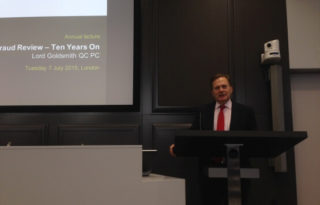The Fraud Advisory Panel charity says the Government is not doing nearly enough to help the public defend themselves against the deluge of fraud and cybercrime and called for an improved local policing response and major public education campaign. The criticisms and call for action are made in the Panel’s latest report, ‘The Fraud Review 10 Years On’ that is published today.
In 2006, the Government published the Fraud Review, the most comprehensive multi-agency, cross sector examination of the fraud fighting landscape every undertaken in the UK that was initiated by Lord Goldsmith the then Attorney General. The Review made 62 recommendations to improve the response to fraud and protect citizens and organisations from this serious threat.
Ground-breaking changes ensued with the design and delivery of the world’s first national service to enable the public to report fraud securely online or via a call centre and the creation of the National Fraud Intelligence Bureau (NFIB) with the people and powerful analytical systems to receive and process millions of pieces of data to prevent and fight fraud.
Despite these advances, fraud has reached epidemic levels globally.; The annual cost of fraudulent activity in the UK alone is estimated to have reached £193 billion. This is an enormous 400% increase compared to the last estimate made in 2013 by the now disbanded National Fraud Authority which put the cost at almost £52 billion a year. Both estimates were considered to be prudent at the time and the reality is the estimates may be just the tip of the iceberg.
Whilst reporting of fraud is increasing, the response by some police forces outside London is ineffective. “If a fraud victim involves their local police force they quickly find that much policing outside London is no better than it was 2005, with little chance of any kind of investigation.” David Kirk, Chairman of the FAP said, “We need a nationwide fraud policing response that can match the challenge and government should find the resources to create it.”
The report also highlights the growth in online crime and Commander Chris Greaney, national coordinator for economic crime says, “The boom in computer-enabled crime is requiring complete change in how we approach policing. But this is a challenge for all of society because the risks are different.”
David Clarke, a member of the original Fraud Review team and the police officer responsible for creating the NFIB agrees there is a need for greater cross sector coordination and feels the priority is to educate the public on how to avoid falling prey to criminals. Clarke says, “The internet is just one of the many tools that fraudsters use to ensnare vulnerable prey. We must teach citizens about the existence of free resources like the Companies House and Solicitors Register and how to use them to identify fraud before they fall victim.” He would like to see the public being as familiar with these tools as they are with ‘Google’.
Click here for a list of some of those websites.
You can download a copy of the FAP report by clicking here
You can download a copy of the Fraud Review Final Report 2006 by clicking here
Photo: Lord Goldsmith PC QC addresses the Fraud Advisory Panel 2016 annual lecture. Photo taken by David Clarke.

